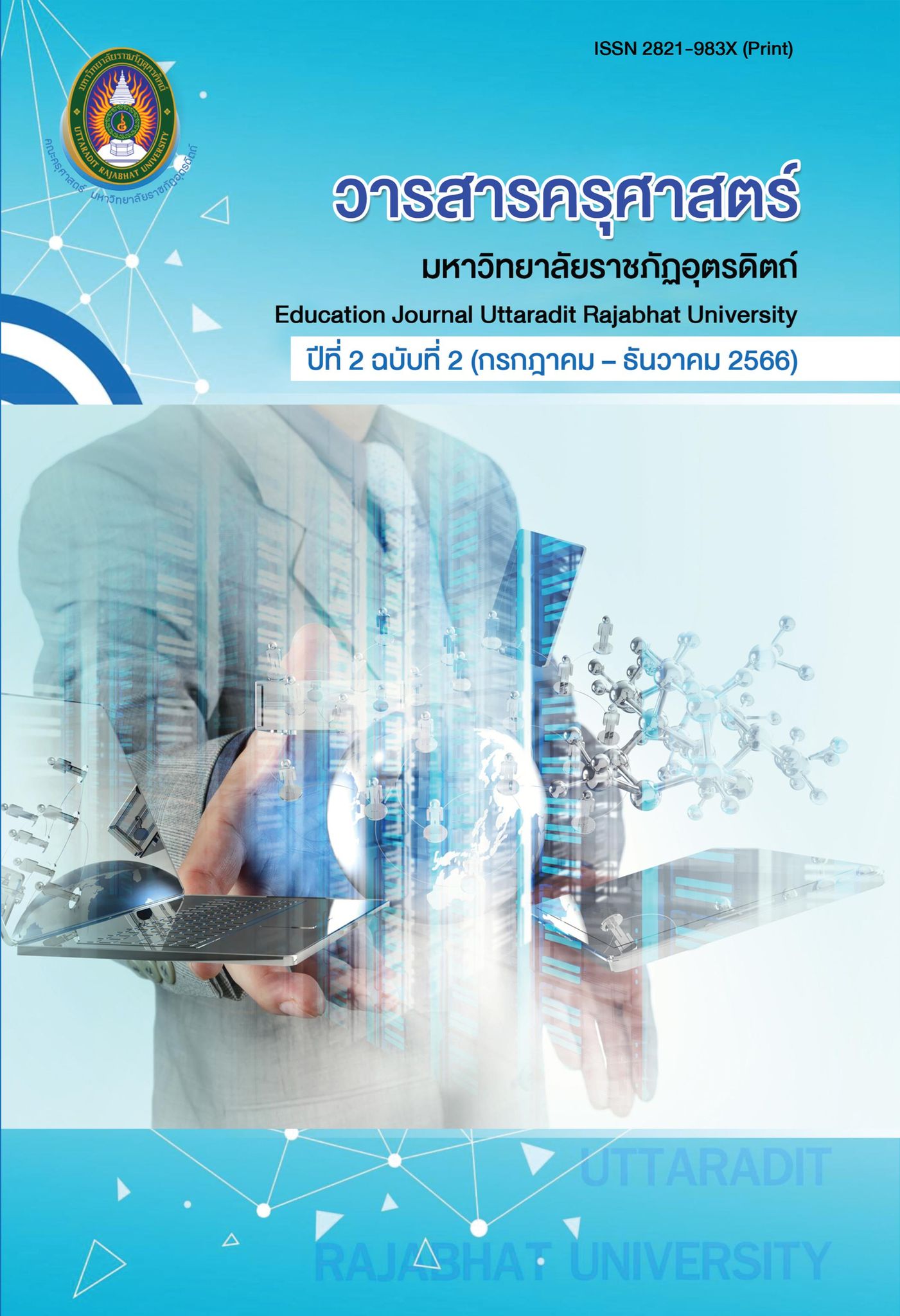Integrated education management with industry at Uttaradit Rajabhat University: A case study of the Bachelor of Engineering program. Department of Intelligent Electronic Engineering
Main Article Content
Abstract
The objectives of this research are 1) to design and create an evaluation tool for the Bachelor of Engineering program. Intelligent Electronics Engineering with Integration of Work and Research (Talent-WIL) 2) To study the results of the implementation of the integrated education project in cooperation with the industrial sector of Uttaradit Rajabhat University (WIL-URU). 3) To follow up and evaluate the educational provision of the Bachelor of Engineering program. Intelligent Electronics Engineering with Integration of Work and Research (Talent-WIL) and 4) to develop systems and mechanisms for managing the Bachelor of Engineering program. The field of Intelligent Electronics Engineering with Integration of Work and Research (Talent-WIL) conducts research. There are 2 phases: Phase 1 is a project to study integrated education management in collaboration with industry at Uttaradit Rajabhat University (WIL-URU) by collecting data from instructors and students in the Bachelor of Engineering program. Major in Intelligent Electronics Engineering and Entrepreneurship in the academic year 2/2020, 18 people, using the Google Form platform, a tool used as a questionnaire about Organize an integrated study with the industrial sector of Uttaradit Rajabhat University (WIL-URU) and phase 2 evaluation of the Bachelor of Engineering program. Department of Intelligent Electronic Engineering (Revised curriculum 2018) by collecting information from experts and instructors in the Engineering-Bachelor degree program. Department of Intelligent Electronics Engineering in academic year 2/2020, number 10 people. The instrument used was a questionnaire on the appropriateness of the Bachelor of Engineering program. Department of Intelligent Electronic Engineering (Revised curriculum 2018) Data were analyzed using averages. Standard deviation and percentage
The results of the research found that the project to study integrated education management with industry at Uttaradit Rajabhat University (WIL-URU) has tools for studying the educational management results of the Bachelor of Engineering program in Intelligent Electronic Engineering with integration. Two editions of the Talent-WIL (Talent-WIL) were carried out to drive the integrated education project in cooperation with the industrial sector of Uttaradit Rajabhat University (WIL-URU). It was found that the Bachelor of Engineering program Department of Intelligent Electronic Engineering Faculty of Industrial Technology Uttaradit Rajabhat University There is a mechanism for organizing integrated education in collaboration with the industry in a systematic way. Starting from the student admission process preparation of students and teachers in the curriculum establishment Learning management throughout the curriculum Supervision and monitoring of students in the workplace Measurement and evaluation of competency-based education By the results of the evaluation According to the opinions of the teachers It was found that the operation was carried out at a high level. in every aspect, with the highest performance in context. Followed by inputs and outputs, and Regarding the process, respectively, and according to the opinions of establishments and students, it was found that operations were at a high level in every aspect as well. It has the highest performance in terms of productivity. Second is the context aspect. Process side and input factors respectively
Results of the evaluation of educational management of the Bachelor of Engineering program The field of Intelligent Electronics Engineering that integrates work and research (Talent-WIL) was found to be at a high level. Bachelor of Engineering Program Evaluation Section Department of Intelligent Electronic Engineering (Revised curriculum 2018) that has a high level of integration of work and research (Talent-WIL). and has a curriculum management system and mechanism that integrates work and research (Talent-WIL)
Article Details

This work is licensed under a Creative Commons Attribution-NonCommercial-NoDerivatives 4.0 International License.
Faculty of Education Journal Uttaradit Rajabhat University It is a medium for disseminating research results. Academic work Any opinions expressed in the article are solely the personal opinions of the author. Faculty of Education Uttaradit Rajabhat University and the editorial team does not necessarily have opinions that are consistent with those expressed in the article in any way. and is not considered the responsibility of the Faculty of Education Uttaradit Rajabhat University and editorial team
References
คณะเทคโนโลยีอุตสาหกรรม. (2561). หลักสูตรวิศวกรรมศาสตร์บัณฑิตสาขาวิชาวิศวกรรม อิเล็กทรอนิกส์อัจฉริยะ. อุตรดิตถ์ : มหาวิทยาลัยราชภัฏอุตรดิตถ์.
ชลายุทธ์ ครุฑเมือง. (2555). พฤติกรรมรับผิดชอบต่อสิ่งแวดล้อม:ปัจจัยและการพัฒนา. (วิทยานิพนธ์ปริญญาดุษฎีบัณฑิต). ขอนแก่น : มหาวิทยาลัยขอนแก่น.
ทีปทัศน์ ชินตาปัญญากุล สมจิตรา เรืองศรี กิตติศักดิ์ ลักษณา และ พรภิรมย์ หลงทรัพย์. การประเมินหลักสูตรแนวใหม่: รูปแบบ CIPPIEST (THE NEW CURRICULUM EVALUATION : CIPPIEST MODEL). วารสารพยาบาลตำรวจ, 9(2): 203-212.
นิธิภักดิ์ กทิศาสตร์ และคณะ (2564). พัฒนาหลักสูตรบริหารธุรกิจดิจิทัล สาขาวิชาธุรกิจดิจิทัล ในรูปแบบการจัดการเรียนการสอนแบบบูรณาการการเรียนกับการทำงาน. วารสารสถาบันวิจัยและพัฒนา มหาวิทยาลัยราชภัฏมหาสารคาม, 8(1): 365 – 376.
ระพินทร์ โพธิ์ศรี. (2554). การสร้างและวิเคราะห์คุณภาพเครื่องมือสำหรับการวิจัย. อุตรดิตถ์: คณะครุศาสตร์ มหาวิทยาลัยราชภัฎอุตรดิตถ์.
รัตนะ บัวสนธ์. (2556). “รูปแบบการประเมิน CIPP และ CIPPIEST มโนทัศน์ที่คลาดเคลื่อนและถูกต้องในการใช้ CIPP and CIPPIEST Evaluation Models: Mistaken and Precise Concepts of Applications,” วารสารศิลปากรศึกษาศาสตร์วิจัย, 5(2): 7-24.
วิภา ตัณฑุลพงษ์. (2560). การพัฒนาหลักสูตรฝึกอบรมเพื่อเสริมสร้างความสามารถ ในการสอนเขียนเชิงสร้างสรรค์และทักษะการผลิตผลงาน การเขียน สำหรับครูในสังกัดสำนักงานคณะกรรมการการศึกษาขั้นพื้นฐาน. สุทธิปริทัศน์, 31(99) กรกฎาคม - กันยายน 2560.


